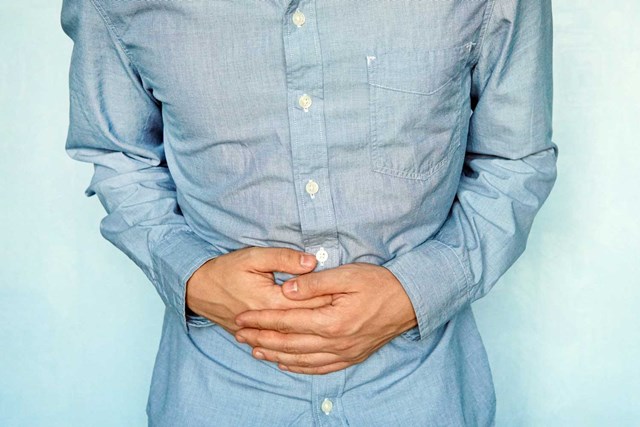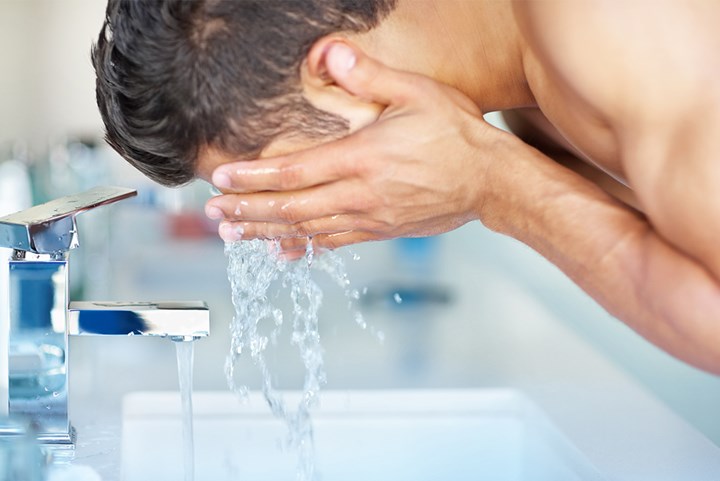
We have no trouble investing on the outside (we have to look good on a night out) but when it comes to the inside, the budget gets tighter than your jeans after leg day
Although according to Nutritional Biochemist and author Dr Libby Weaver, we should be putting our money where our mouth is, literally.
“Our skin is a useful tool for exploring deeper issues. Flare-ups of pimples, acne, rosacea, eczema, and rashes can be a signal that other body systems may not be functioning at their best.” Yep, more often than not, it’s the gut that needs attention. “Poor digestion can lead to liver detoxification pathways that then struggle to clear unwanted substances from the body. When these substances are not eliminated efficiently the body looks for another way to excrete them and the skin is then used as an excretory organ.”
We quizzed Dr Libby on how to get your skin in check. Take notes.
RELATED: The 5 Best Supplements For Men
A lot of women put their skin issues down to external factors like sweat and make up. What are some hormonal issues to look at?
“While what we put on our skin plays a part, mostly skin breakouts are a result of what’s happening inside the body. Along with digestion, hormonal imbalances are another common reason behind skin issues. I encourage people to learn to listen to their body’s messages (symptoms) and use them to understand what might not be functioning optimally inside. If we look at the symptoms we experience like bloating, low energy, headaches, skin breakouts, rashes, period pain or mood fluctuations as messages from our body that something needs to change, we begin to understand that our body is simply trying to communicate to us that we need to alter something. Typically, the most common sex hormone imbalance pattern is oestrogen dominance, which means oestrogen is dominant in the second half of the cycle leading up to menstruation, as opposed to progesterone – this can lead to irritability, skin break-outs, low mood, fluid retention – essentially the symptoms of PMT. There are a number of substances I affectionately call ‘liver loaders’ that many people could reduce their consumption of and that often lay at the heart of many women’s sex hormonal imbalances. They include alcohol, caffeine, trans fat, refined sugars and synthetic substances such as pesticides, medications and what enters our blood via what we put on our skin.”
What are the best vitamins to dose up on to boost skin health?
Vitamin A
“Influences the physiology of the skin in a number of ways. When it comes to acne or blackheads, it acts to inhibit sebaceous gland activity. Regulating sebaceous glands is the aim of a lot of cosmetic solutions for the skin, as glandular activity determines if your skin is “oily”, via the production of sebum. The most vitamin A-rich foods are liver and cod-liver oil, but other sources include kidneys, organic butter from pastured (grass-fed) cows, and egg yolks. Vegetarian sources of vitamin A have to be converted from beta-carotene sources of this include leafy green vegetables, orange and yellow vegetables, tomatoes, and certain fruits, such as apricots and grapefruit.”
Vitamin E
“Is a powerful antioxidant that can penetrate through layers of skin, assisting the body with the natural wound-healing process. Vitamin E also helps to renew skin cells, making them stronger by reducing oxidative stress. When the body experiences oxidative stress, cellular function can be inhibited, and the skin may look dull. An optimal intake of vitamin E may also help reduce the appearance of wrinkles, and, when applied topically, vitamin E soothes dry or rough skin. Food sources of vitamin E include eggs, sunflower seeds, almonds, and avocados.”
Vitamin D
“The active form of vitamin D controls many processes essential to beauty, including skin repair and skin-cell production. Vitamin D is also critical for the health of the hair follicles, and hair loss has been associated with vitamin D deficiencies (among other nutrient deficiencies). Vitamin D is essential to bone health and the prevention of numerous degenerative diseases, including cancer. Food sources of vitamin D include fatty fish, organic butter and egg yolks. However, by far the best way to get vitamin D is with safe sun exposure.”
Vitamin C
“Is highly effective at reducing free radical damage, such as that caused by overexposure to the sun or pollution. Free radicals consume collagen and elastin, promoting wrinkles and other signs of premature aging. Vitamin C is also involved in the production of collagen, not just the prevention of its breakdown, and, when combined with vitamin E, it has been shown to be particularly effective at protecting the skin from over-exposure to the sun. Vitamin C-rich foods include citrus fruits, berries, kiwi fruit, capsicums, broccoli and kale.”
B-group vitamins
“Are essential to skin health. Vitamin B1 (thiamine) is beneficial to hair and skin because it increases blood flow to the cells. Vitamin B3 (niacinamide) and vitamin B5 (pantothenic acid) are helpful in the process of skin regeneration, and can help slow the signs of aging skin when consumed daily in the diet. Synthetically derived vitamin B3 is becoming a very popular skin-care ingredient due to its use in treating stubborn acne, pigmentation, and dryness. Folate, a B vitamin, and vitamin B12 are both essential for healthy, strong nails, and biotin, another B vitamin, is highly involved in the processes that create healthy, lustrous hair. Beans and lentils are good source of B1, eggs are good sources of B2 and B6 and leafy greens are good sources of folate to name a few.”
What is the one thing you would love to see all women do for their overall health each day?
“Remember how you eat, drink, move, think, breathe, believe and perceive all impact how you show up each day. Your biochemistry, the nutrients you consume, as well as your beliefs impact whether you experience energy or not. We must give our body what it needs to create the conditions inside of us that allow us to feel energised, vibrant and have radiant health… and skin!”
This article originally appeared on Women’s Health

















